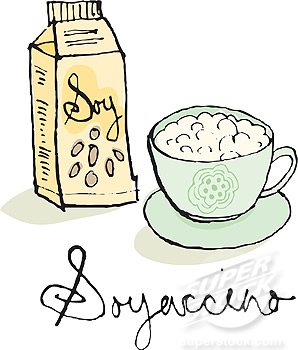The YogaWellbeing team can’t believe it I have finally done something I have been umming and arring about for quite a while now, I have given up dairy for soya milk. To be completely honest at first I thought it was completely tasteless and had a hard time pouring it into my bowl of much loved multi seeded extravaganza cereal. I feel like one month on I really should eat my words, I am loving the soya stuff.
If you’re considering giving up dairy products, for whatever reason, the choice has never been easier. With an abundance of milk substitutes made from ingredients such as soybeans, oats, rice, and almonds, you have plenty of choice. From nonfat versions to even some chocolate flavoured versions (which is next on the list for me) nondairy milk comes in many colourful varieties.
Some of its benefits may surprise you. Soymilk, for example, contains isoflavones, which some research suggests can help protect against cancer, maintain bone health. It also contains the most protein of the nondairy alternatives. Almond milk is a good source of vitamin E, a heart-healthy antioxidant. And many nondairy milks are fortified with nutrients like calcium and vitamin 0. Best of all, they are naturally low in fat and are cholesterol free. Going dairy free may be the healthiest choice you can make, dairy products have been linked with heart disease, some cancers and diabetes. Nondairy milk can almost always be substituted for cow’s milk: pour it on your cereal, drink it straight from a glass, or use it in baking. But not all varieties work equally well in all circumstances. Rice and oat milk, for example, tend to be sweeter and thinner than soymilk, so aren’t favored for creamy sauces. When it comes to nondairy milk, taste preferences may be your best guide.
Here’s a mini guide to what’s out there
RICE
Low in fat and easy to digest rice allergy is uncommon. + Not a nutrient-rich source but often fortified with calcium and vitamins 0 and B12; usually sweetened.
ALMOND
Low in fat; usually fortified with calcium and vitamins, pretty obviously not an option for those allergic to nuts.
SOY
The most protein-rich non- dairy milk; usually fortified with calcium and vitamin a 1 cup soymilk contains 30 mg of isollavones.









LoLllll